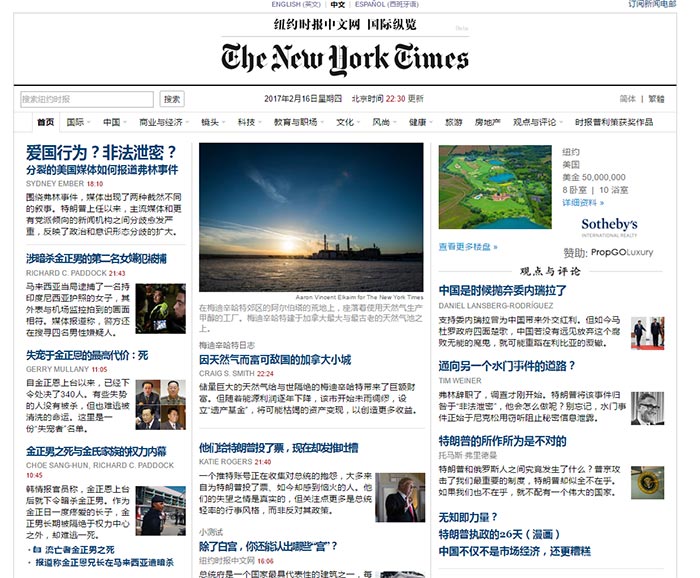10 Jul 2017 | Asia and Pacific, Campaigns -- Featured, China, Statements
[vc_row][vc_column][vc_column_text]Update: On 13 July 2017 the Chinese Nobel Peace Prize winner Liu Xiaobo, jailed for his pro-democracy work, died in hospital aged 61.
Chinese Nobel Peace Prize laureate and writer Liu Xiaobo, who was imprisoned since 2009 for calling for more freedom in his country, has been diagnosed with terminal liver cancer. He was recently released into hospital for treatment and his state of health is considered critical.
Index calls on the UK government to urge China to release Liu immediately and allow him to travel abroad for treatment. It also calls on the UK ambassador to visit Liu and his wife the poet Liu Xia in the hospital. In the past few days, Liu has reiterated his request to be able to travel to have medical treatment.
Liu’s friends and journalists report trying to visit the couple in the hospital and being beaten by police.
In December 2008, Liu co-drafted Charter 08, a document modelled on Václav Havel’s Charter 77, written in Communist Czechoslovakia 30 years earlier. The document outlines the basic principles and fundamental rights that should govern China’s political landscape including freedom of association. Over 350 intellectuals and activists initially signed it, with a further 10,000 people including academics, journalists and businessmen adding their names to it upon its release. The government’s reaction to Charter 08 was swift and harsh. Liu was initially arrested two days prior to its official publication and later charged with 11 years in prison for incitement to subversion, during a trial in which he said he had no enemies. Index has repeatedly called for his release.[/vc_column_text][/vc_column][/vc_row][vc_row][vc_column][vc_basic_grid post_type=”post” max_items=”4″ element_width=”6″ grid_id=”vc_gid:1499953076038-54c71786-d828-10″ taxonomies=”85″][/vc_column][/vc_row]
17 Feb 2017 | China
[vc_row][vc_column][vc_column_text]

The New York Times is blocked in China.
Last month, China’s Ministry of Industry and Information Technology unveiled the country’s a new 14-month campaign to tighten control over the internet. The Chinese government is specifically concerned about virtual private networks, which punch holes through the country’s so-called “Great Firewall”. Without the VPNs, China’s internet users are unable to browse some of the world’s largest web sites. So the campaign made big news around the world.
But Charlie Smith of the 2016 Index on Censorship Digial Activism Award-winning GreatFire, an anonymous collective fighting Chinese internet censorship, told us that the VPN campaign is “actually kind of being mis-reported by the press, in general. It’s not as big a deal as it is being made out to be. We’d make a lot of noise if it was a big deal.”
Here are just six sites that are regularly blocked by China’s Great Firewall:
- YouTube
YouTube was first blocked in March of 2008 during riots in Tibet and has been blocked several times since, including on the 25th anniversary of the Tiananmen Square protests in 2014. At the time of the Tibetan riots, much of China’s population speculated that the YouTube ban was an attempt by the government to filter access to footage that a Tibetan exile group had released.
- Instagram
It’s typical for China’s internet censors to go into overdrive during politically sensitive events and/or time periods, which is why it doesn’t come as a surprise that Instagram was blocked in 2014 after pro-democracy protests in Hong Kong. To some, the block on Instagram during the protests exposed Beijing’s fears that people in the mainland might be inspired by the events taking place in Hong Kong. While some parts of the social media site may be restored, the site is still listed as 92 percent blocked.
- The New York Times
In late December 2016, the Chinese government made waves by ordering Apple to remove their New York Times app from the Chinese digital app store. According to the newspaper, the app had been removed on 23 December under regulations prohibiting all apps from engaging in activities that endanger national security or disrupt social order. The New York Times website as a whole has been blocked since 2012 in China, after the newspaper published an article regarding the wealth of former prime minister Wen Jiabao and his family. People turned to the NYT app after the blockage in order to maintain access to the the paper’s stories. Now that the app is blocked as well, the New York Times is only available to those who had downloaded the app before its removal from the store.
- Bloomberg
In June of 2012, the popular business and financial information website published a story regarding the multimillion dollar wealth of Vice President Xi Jinping and his extended family. Considering this story too invasive, the Chinese government blocked Bloomberg and has yet to reopen the site to the public. At the time, the Chinese government was going through a period of transition, as power shifted from then President Hu Jintao to Jinping.
- Twitter
Censors in China blocked access to Twitter in June of 2009 in anticipation of the 20th anniversary of the pro-democracy protests in Tiananmen Square. The move seems to reflect the government’s anxiety when it comes to the anniversary and the sensitive memories that come with it. The blocking of Twitter has also allowed for the rise of the Chinese app Weibo, a censored Twitter clone, which quickly became one of China’s most popular.
- Reuters
One of the more recent bans by the Chinese government came in the form of the international news agency Reuters. In March 2015, the organisation announced that both its English and Chinese sites were no longer reachable in the country . China has blocked media outlets like Reuters in the past, but these moves have always come after the release of a controversial story. In the case Reuters, the ban seemed to have come out of nowhere, with the reason behind the blockage still unclear.[/vc_column_text][/vc_column][/vc_row][vc_row][vc_column][vc_basic_grid post_type=”post” max_items=”4″ element_width=”6″ grid_id=”vc_gid:1487260644692-d841ab7e-8ed3-4″ taxonomies=”85″][/vc_column][/vc_row]
4 Oct 2016 | Asia and Pacific, Awards, China, Fellowship, Fellowship 2016, mobile, News and features

In April 2016 the US government called China’s Great Firewall a barrier to trade. This came just months after the US criticised China for cyber spying on American companies, or what the Justice Department called the “great brain robbery”.
“Obama keeps saying that if China continues employing its hacking units to attack US companies, America will tear down the Great Firewall,” Charlie Smith, co-founder of GreatFire, the anonymous group of individuals who work towards circumventing China’s Great Firewall and winners of the 2016 Index on Censorship Freedom of Expression Award for digital activism, told Index. “Great – so tear it down, let’s go.”
But it’s not happening, Smith added.
Over on the other side of America’s political spectrum, US senator Ted Cruz has been busy over the last month trying to get the US Congress to act to “prevent the Obama administration from giving the internet” to China. Cruz failed in his mission, as on 1 October the US gave up its remaining control over the internet, with the California-based Internet Corporation for Assigned Names and Numbers (ICANN) no longer under the direction of the Department of Commerce.
There are now fears that the change will open the door for authoritarian governments, including China’s, to get control of the network of networks, leading to greater censorship.
In Cruz’s first letter to ICANN, kicking off his attempt to stop the move, the former presidential hopeful quoted GreatFire’s research into internet censorship in China.
“I then reached out to them and said: ‘Hey, we’re GreatFire, what more do you want to know?’” Smith said. “ICANN has a representative in Beijing and that representative sits in the Cyberspace Administration office, which is censorship central, so Cruz’s campaign was very interested in that.”
Although GreatFire would not align themselves with a political party, Smith added that if Cruz really believes what he is saying and GreatFire can help, the organisation will support him on this issue.
GreatFire’s own efforts to put a hole in China’s firewall took a new turn in July 2016 with the launch of its groundbreaking new site to test virtual private networks within the country, Circumvention Central. “Stable circumvention is a difficult thing to find in China so this new site a way for people to see what’s working and what’s not working,” Smith told Index at the time.
Speaking three months on, Smith told us that although the site works and customers are overwhelmingly pleased with the service, it isn’t making as many sales as he’d hoped it would. In August the platform sold a few dozen subscriptions but Smith was really hoping to see numbers in the hundreds by this stage.
“Maybe we’re not getting enough people to the site,” Smith said. “I guess it’s timing too; people have other subscriptions that haven’t yet expired, so they’re not ready.”
“What we have done, however, is engaged with some VPN firms like a paid consultancy service and helped them improve what they are doing,” Smith added. “It’s actually been quite revealing because we can see the volatility in the market and how one service may work really well this month and next month it will basically be useless.”
GreatFire is working closely with VPN services Hide My Ass and AnchorFree, both of whom have been introductions from Index on Censorship.
The Chinese government has taken notice of Circumvention Central, sending an email to all VPN providers listed on the site asking them not to stop operating in China but to cease working with GreatFire specifically.
One reads: “Please immediately stop working with GreatFire.org. GreatFire.org is an anti-China website as declared by the Cyberspace Administration of China. We hereby express our strong concern and request you stop working with GreatFire at the earliest time possible.”
“So there’s no real serious threat from the government there,” Smith said, adding that although Chinese authorities are constantly trying to take down or attack the site, they have been wholly unsuccessful.
GreatFire is also working on its free internet browser that allows users to access content that’s behind China’s firewall. The browser is currently available in English and Chinese, but will soon be available in traditional Chinese, Arabic, Spanish, Croatian and Persian.
“We’re currently looking for publications in those languages that are blocked so we can help provide access,” said Smith.
The main focus for the future, however, is the VPN service. “We believe we have the best circumvention tool on the market and we want to show people how it works and drive adoption.”
Also read:
Smockey: “We would like to trust the justice of our country”
Zaina Erhaim: Balancing work and family in times of war
Artist Murad Subay worries about the future for Yemen’s children
Nominations are now open for 2017 Index on Censorship Freedom of Expression Awards. You can make yours here.



